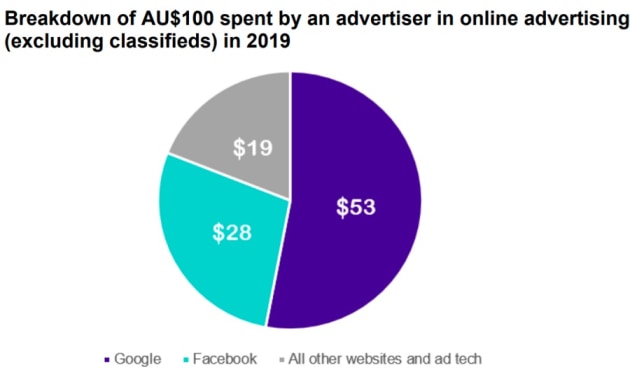Facebook's decision to pull out of Australia, and Google's decision to strike deals with local publishers, isn't the morality play people think.
It's much more about whether businesses should be able to monopolize our online experience: https://www.bloomberg.com/opinion/articles/2021-02-18/google-and-facebook-lose-a-battle-to-win-the-war?srnd=opinion&sref=5JzLFdzD
It's much more about whether businesses should be able to monopolize our online experience: https://www.bloomberg.com/opinion/articles/2021-02-18/google-and-facebook-lose-a-battle-to-win-the-war?srnd=opinion&sref=5JzLFdzD
A lot of people who hate Australia's news media bargaining code explain it in terms of hating one of its key supporters, News Corp.
A lot of people who love it explain it in terms of hating its two key opponents, Google and Facebook.
A lot of people who love it explain it in terms of hating its two key opponents, Google and Facebook.
I think that's a pretty unhelpful way of looking at it, and I think the approach taken from the start by the @acccgovau is a sensible one:
Where does the power lie in the online marketplace? What anticompetitive co-benefits flow from that power? How can imbalances be redressed?
Where does the power lie in the online marketplace? What anticompetitive co-benefits flow from that power? How can imbalances be redressed?
I think it's pretty hard to deny that Google and Facebook have a market share that gives them monopolistic power:
The question then becomes: Is that power being used to stifle competition?
The examples of this are legion. The U.S. Department of Justice launched a major antitrust case against Google last October: https://www.justice.gov/opa/pr/justice-department-sues-monopolist-google-violating-antitrust-laws
The examples of this are legion. The U.S. Department of Justice launched a major antitrust case against Google last October: https://www.justice.gov/opa/pr/justice-department-sues-monopolist-google-violating-antitrust-laws
The EU has fined Google $10 billion over anticompetitive practices in the past few years: https://ec.europa.eu/commission/presscorner/detail/en/IP_19_1770
And at ground level, Google and Facebook are both *competitors* with local publishers in the market for digital advertising, and *key conduits* that link publishers with advertisers through search functions.
That sort of two-track business is open to serious abuse.
That sort of two-track business is open to serious abuse.
What's worse, the operations of the millisecond online auctions that link advertisers with owners of ad space are extremely opaque.
The intermediaries, Google and Facebook, are coining it, but it's not obvious to the other participants whether the market is operating fairly.
The intermediaries, Google and Facebook, are coining it, but it's not obvious to the other participants whether the market is operating fairly.
I think the @acccgovau solution is a pretty sensible one.
Allow publishers to collective bargain as a group in recognition of their weaker individual power, the same way that unions do with their employees or franchisees do with their franchisors.
Allow publishers to collective bargain as a group in recognition of their weaker individual power, the same way that unions do with their employees or franchisees do with their franchisors.
That gives you a more level playing field between the two sides. If they're still unable to agree, go to an independent arbitrator and get each side to submit their best case for what the business is worth.
Whoever the arbitrator judges is making a more honest and realistic case wins the day.
Both Facebook and Google strongly object to this model, arguing that this form of arbitration is fundamentally wrong and will allow publishers to force platforms to pay any price they want.
Both Facebook and Google strongly object to this model, arguing that this form of arbitration is fundamentally wrong and will allow publishers to force platforms to pay any price they want.
This is a silly argument. If publishers put forward a silly, exploitative request and platforms put forward a sensible one, the arbitrator will accept the platforms' request. The reverse, of course, is also true.
This is a good game-theory way of getting honest answers about pricing and costs when both parties are a long way apart. The penalty for putting in a fanciful request is very high -- you lose everything -- so the incentive to deal honestly is very powerful.
To me it's very telling that Facebook and Google have absolutely thrown their toys out of the pram at the prospect of having to open their black box a little to show what news -- and online data more generally -- is worth to them.
Pulling the plug connecting Facebook and Australian news, and threatening to cut off Google search in Australia altogether, is to me a bit of a tell about just how much they're prepared sacrifice to protect this knowledge from their counterparties. It's their kryptonite.
According to the U.S. DoJ, Google pays Apple about $8bn-$12bn a year to be the default search engine on Apple devices -- equivalent to nearly a fifth of Apple's net income.
https://www.justice.gov/opa/press-release/file/1328941/download
https://www.justice.gov/opa/press-release/file/1328941/download
Monopolistic positioning is *very, very* important to these businesses. It's one reasons why their rivals (sorry, Bing and Snapchat) just aren't as good -- they don't have the vast firehose of data that Google and Facebook have to serve their customers well.
What I like about the ACCC's model is precisely that the government isn't making a judgement about how to split the baby. It's levelling the playing field and encouraging market participants to sort it out with each other.
If news is worth less to Google and Facebook than publishers claim, the publishers will lose out from this process -- but the platforms are not acting like that's remotely a possibility.
I think the question of how money is made in digital media is a lot too murky, and I'd like a like shined on it. If this proposal fails in Australia, I hope other countries take up similar approaches.
Read the full column here: https://www.bloomberg.com/opinion/articles/2021-02-18/google-and-facebook-lose-a-battle-to-win-the-war?srnd=opinion&sref=5JzLFdzD

 Read on Twitter
Read on Twitter


